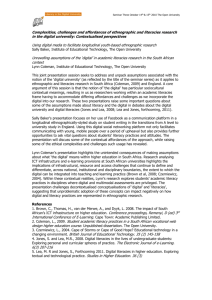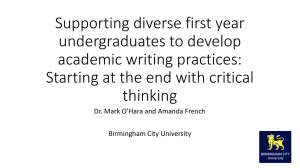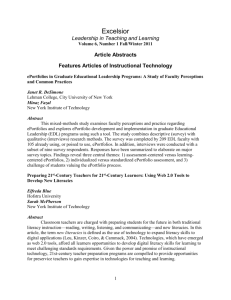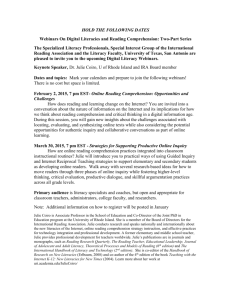Academic Literacies Working Group
advertisement
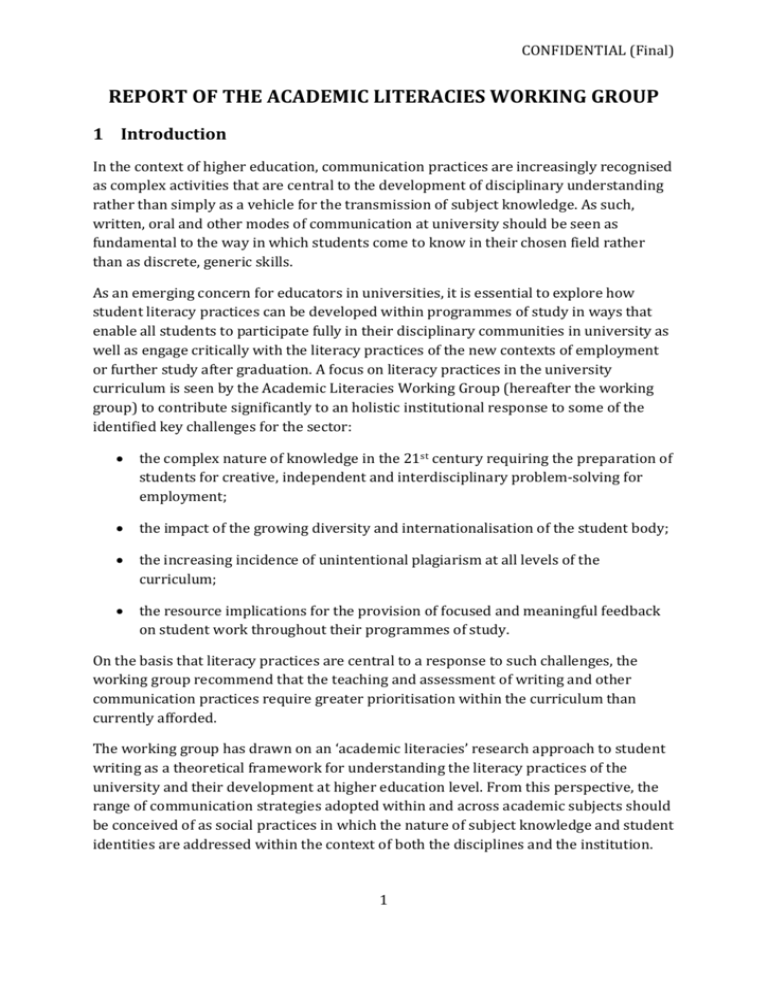
CONFIDENTIAL (Final) REPORT OF THE ACADEMIC LITERACIES WORKING GROUP 1 Introduction In the context of higher education, communication practices are increasingly recognised as complex activities that are central to the development of disciplinary understanding rather than simply as a vehicle for the transmission of subject knowledge. As such, written, oral and other modes of communication at university should be seen as fundamental to the way in which students come to know in their chosen field rather than as discrete, generic skills. As an emerging concern for educators in universities, it is essential to explore how student literacy practices can be developed within programmes of study in ways that enable all students to participate fully in their disciplinary communities in university as well as engage critically with the literacy practices of the new contexts of employment or further study after graduation. A focus on literacy practices in the university curriculum is seen by the Academic Literacies Working Group (hereafter the working group) to contribute significantly to an holistic institutional response to some of the identified key challenges for the sector: the complex nature of knowledge in the 21st century requiring the preparation of students for creative, independent and interdisciplinary problem-solving for employment; the impact of the growing diversity and internationalisation of the student body; the increasing incidence of unintentional plagiarism at all levels of the curriculum; the resource implications for the provision of focused and meaningful feedback on student work throughout their programmes of study. On the basis that literacy practices are central to a response to such challenges, the working group recommend that the teaching and assessment of writing and other communication practices require greater prioritisation within the curriculum than currently afforded. The working group has drawn on an ‘academic literacies’ research approach to student writing as a theoretical framework for understanding the literacy practices of the university and their development at higher education level. From this perspective, the range of communication strategies adopted within and across academic subjects should be conceived of as social practices in which the nature of subject knowledge and student identities are addressed within the context of both the disciplines and the institution. 1 CONFIDENTIAL (Final) Whilst there is vociferous debate about the perceived falling standards of students’ writing skills prior to university entry and the impact of the expansion of ‘access’ for ‘non-traditional’ students and international students has lead to a greater range of communication practices within the academy, the working group believes that institutional approaches should not construe such diversity as a problem to be resolved through remedial support for individual students outside of the mainstream curriculum. The working group recognises the limitations of adopting a deficit view of student written and oral practices to address these issues at the higher level. Programmes of study should therefore provide all students with the opportunity for a dynamic, critical and reflective engagement with literacy practices in the context of the academy. In arguing for focused and ongoing support for literacy in higher education, attention is typically given to the teaching of academic writing. The proposal for the enhancement of student literacies in the curriculum outlined in the following report, however, is not limited to student writing but is inclusive of the wider repertoire of literacy practices within the academy that are aligned to the range of disciplines taught at both King’s College London (KCL) and the University of Warwick (Warwick). There is a need to recognise and enhance not only text-based literacies traditionally supported through writing interventions but also to explore the potentialities of engaging critically with numeric, graphic and practice-based modes of communication to recognise and theorise the use of gesture, movement or image central to some disciplines (e.g. midwifery, physiotherapy, performance arts) as well as wider conceptions of writing practices in numerate or cognate subjects (e.g. mathematics, chemistry, engineering). The emphasis on literacy practices in the curriculum also requires the recognition of the central role assessment plays in providing opportunities for dialogue between students and academic staff concerning the nature of writing and other communication practices. Reform of the curriculum should seek to open up spaces for ongoing formative feedback and for the exploration of alternative forms of assessment beyond traditional essay assignments and is essential for the enhancement of student literacy practices at university. This report presents a brief literature review of relevant academic literacies research as a conceptual framework for enhancing the higher education curriculum as well as an assessment of current practice at KCL and Warwick in the development of student literacies. The report also summarises the preliminary outcomes of relevant KCL College Teaching Fund (CTF) projects and case examples of innovative practice in both institutions to inform the recommendations for the integration of focused enhancement of student literacies at both the strategic and applied level of the curriculum. 2 CONFIDENTIAL (Final) 2 An academic literacies approach to the curriculum 2.1 Academic literacies as a conceptual framework for literacy enhancement There are increasing claims in the sector that students struggle with the demands of academic writing and other literacy practices in their programmes of study. Such issues are not simply the outcome of the ‘access’ of ‘non-traditional’ students into higher education but affect students from all backgrounds and at all levels. An academic literacies approach to student writing offers a significant strategy for understanding and developing the provision of writing support at university. Drawing on a review of academic literacies research, the working group recognises that an academic literacies approach to student literacy in the curriculum should: adopt a transformative rather than normative perspective towards student writing in the context of the university (Lillis & Scott, 2007); engage critically with different genre within and between different disciplines; provide opportunities for dialogue between academic staff and students about literacy practices; embed student understanding and enhancement of literacy practices in the context of their programme of study. Although the development of academic literacies as a curriculum design frame in higher education has so far been limited (Lillis, 2003), the working group has sought to draw on the potentialities afforded by an academic literacies critical perspective to inform the proposals for the strategic and pedagogic enhancement of the curriculum whilst also extending the scope of the definition of the term to include a broader range of literacies beyond the traditional privileging of writing practices evident even within some academic literacies research. The following overview of academic literacies as both a research and a pedagogic position also draws on the reports and discussion papers prepared by working group members and other participants during the project. 2.1.1 A transformative rather than normative perspective towards student literacies Lea and Street (1998) have argued that models of student literacy in higher education have accounted for student writing within one of three main perspectives: as technical and instrumental (study skills); as acculturation into the discourses of the discipline (academic socialisation); as a social practice (academic literacies). 3 CONFIDENTIAL (Final) Models of student literacy at university that frame communication practices as a decontextualised study skill transferable to any situation or that perceive the university as a specific discursive context into which students must be socialised are recognised by the working group as inappropriately crude and normative responses to the complexities of communication practices in the context of higher education. An academic literacies approach, however, engages with the complexities of individual, disciplinary and institutional identities as the basis for all higher learning in the university. The working group recognises that such an approach is transformative in orientation by focusing on: a) locating such conventions in relation to specific and contested traditions of knowledge creation; b) eliciting the perspectives of writers (whether students or academic staff) on the ways in which such conventions impinge or inform their meaning-making; c) exploring alternative ways of meaning-making in academia not least by recognising the resources that (student) writers bring to the academy as legitimate tools for meaning-making. Currently, the study skills and socialisation models of student writing have been seen to dominate approaches to curriculum design (Lea & Street, 2006). In a review of the literature, the working group observes that an alternative academic literacies approach to enhancing student literacy practices works towards a transformative and critical account of communication practices in the curriculum through the strategies outlined in sections 2.1.2 to 2.1.4 below. 2.1.2 Critical engagement with different genre within and between disciplines An academic literacies approach sees the literacy demands of the curriculum as involving a variety of communication practices. For students a dominant feature of academic literacy practices is the requirement to switch practices between one setting and another, to deploy a repertoire of linguistic practices appropriately to each setting, and to handle the social meanings and identities that each evokes (Lea & Street, 2000: 35). Research on student writing in higher education suggests that many student literacy problems can arise from the different requirements of different genre in different courses, the implicit nature of these requirements and the gaps between academic staff expectations of specific ways of communicating and students’ interpretation of what is required in assessment (Lea & Street, 1998; Lea and Street, 2006). The implication for the enhancement of literacies in the curriculum is the need for critical consideration of the ways in which programmes of study can provide “pedagogic 4 CONFIDENTIAL (Final) spaces for exploration of all the different and contrasting textual practices” (Lea, 2004: 745). Such spaces should provide opportunities for students to reflect critically on the different genre, to practise communicating in different genre and to receive feedback on their different practices. 2.1.3 Provision of opportunities for dialogue between academic staff and students The transition from school into post-compulsory education or from other educational contexts into UK higher education potentially raises problems for all students and not only non-native English speakers. In the context of the university, understanding or misunderstanding of the academic conventions underpinning assessment, plagiarism and feedback mechanisms can position all students as “cultural others” (Leask, 2006: 189) in relation to the academic conventions of the institution and discipline. Lillis (2006) has argued that one strategy for enhancing understanding of the relationship between identity and communication practices is by providing more opportunities for different types of dialogue between students and tutors that enables both the participation of students in dominant practices in higher education whilst also “allowing space for challenging conventions in a changing higher education context” (33). Such dialogue should foreground the nature of academic conventions in ways that enable students and academics to collaboratively investigate the range of genres, modes, shifts, transformations, representations, meaning-making processes, and identities involved in academic learning within and across academic contexts (Lea & Street, 2006: 376). Interventions that focus around mutual participation in such conversations moves staff and students on from seeing writing and other communication skills as merely technical. In developing beyond an instrumental approach to literacies, such dialogue may also “encourage students to think of themselves as authors, and construct more authorial identities as academic writers” (Pittam et al., 2009: 166). The exploration of authorial identities can improve academic writing, develop student independence as learners and reduce unintentional plagiarism. Such an approach based on collaboration between students and academics demonstrates the underlying pedagogic principles of student-centred learning whereby students actively participate in the development of their academic skills and understanding. 2.1.4 Embed the enhancement of student literacies in the programmes of study An academic literacies approach to the curriculum demands that there is opportunity for all students and their lecturers in all disciplines at all levels to engage critically with their literacy practices in the context of their chosen programmes of study. As Wingate (2006) has argued, extra-curricular writing support “has severe limitations because it separates study skills from the process and content of learning” (457). The complex 5 CONFIDENTIAL (Final) learning desirable at higher education level through engagement with a full range of literacy practices “can only be achieved within the subject and through explanations, modelling and feedback by subject tutor” (463). In addition, with the changing nature of knowledge in the 21st century where the most complex problems cut across disciplines, the correspondent shift in higher education towards increasingly interdisciplinary teaching and learning will require lecturers and their students to think about the relationship between disciplinary ways of knowing and literacy practices in more reflexive and critical ways (Somerville & Creme, 2005). The enhancement of literacy practices, therefore, is best served by an embedded model of provision within the mainstream curriculum. 2.2 Examples of UK embedded literacy initiatives Although composition courses, writing in the disciplines (WID) and writing across the curriculum (WAC) programmes are well-established strategies for enhancing student writing in US higher education (for example see Young, 1999), such strategies remain less well-developed in the UK. There are a number of initiatives, however, that draw upon the academic literacies approach to think about writing support at universities in the UK. An example of this is the Thinking Writing initiative at Queen Mary University London, inaugurated to: enhance the development of student writing through supporting staff and departments in the piloting of new discipline-based writing-intensive courses and through the dissemination of good practice. Sally Mitchell, as head of the Thinking Writing Unit, was instrumental in carrying these perspectives into different disciplines and working with tutors to help support their students’ writing in ways that corresponded closely to discipline needs and practices (for more information see http://www.thinkingwriting.qmul.ac.uk/). The Write Now Centre for Excellence in Learning and Teaching also seeks to draw on a collaborative approach to working with disciplinary specialists and students to enable staff and students to reflect critically on their writing practices in the disciplines, particularly focusing on the use of student peer mentoring (Harrington et al., 2007; see also Devet et al., 2006 for discussion of peer mentoring for literacy development) and assessment criteria (Harrington et al. 2006; see also Stacey and Granville, 2009 for discussion of formative assessment for the enhancement of literacy practices) as strategies for embedding writing support in the disciplinary context (for more information on Write Now see http://www.writenow.ac.uk). The examples of Thinking Writing and Write Now are models of embedded approaches to the development of student literacies that emphasise collaboration between academic specialists and experts in student writing to enhance literacy practices in the context of the discipline. 6 CONFIDENTIAL (Final) 2.2.1 The role of technology in an academic literacies approach Technology has been presented as one key pedagogic solution to embedding literacies support within the curriculum. There are examples of excellence in the use of e-learning to support the development and embedding of literacies within the disciplines through collaboration between subject specialists and experts in writing pedagogy that draw on disciplinary resources (e.g. Wingate & Dreiss, 2009 summarised in section 3.1.3 below). It is important, however, that the use of e-learning as a locus for the development of writing does not implicitly reaffirm a distinction between discipline content that is prioritised through classroom face-to-face interaction and writing practices as extracurricular, optional activities carried out online. Ivanič and Lea (2006), for example, warn “Is technology taking centre-stage and overshadowing more fundamental issues of literacies in higher education?” (11). In addition, Goodfellow (2005) has noted the need to be aware of the “complexity of […] virtual environments as writing spaces” (483) and to have a “critical awareness of online writing practices” (493). The online environment does not function as a neutral space for writing but constructs practices in ways that potentially differ from the traditional writing spaces in the curriculum. Any recommendation for the development of student literacies through e-learning would need to also investigate and critique the range of spaces within which literacy practices operate and the impact such spaces might have on practices. 3 Review of current policy and practice at KCL and Warwick In reviewing current approaches to provision at KCL, it is noted that the predominant view of student literacy reported by Learning and Teaching Coordinators is that the “lack of what were described as ‘basic’ skills limited the opportunity for students to develop their own voice that could be ‘recognised’ within the disciplines” (Lygo-Baker, 2009: 9). The focus for development, therefore, is on basic provision of literacy and numeracy skills. Similarly, at Warwick the analysis of departmental discourses about student literacies found that such practices were largely characterised by a skills agenda: This discursive focus on the development of atomized skills, transferable and suitable for employability, suggests that the departments have a normative understanding of ‘academic literacy’, fostered by the dominant autonomous model of literacy/learning in which they function (Mockridge et al., 2009: 35). At both institutions, however, the notion of academic literacies was perceived as more than simply writing skills and other modes of communication were identified as signature practices distinctive to different disciplines and central to participation within the fields. Modelling of appropriate communicative behaviours in the clinical environment in medical, dental and nursing contexts and the learning of laboratory 7 CONFIDENTIAL (Final) skills in sciences or theatrical performance in theatre studies were all identified as important modes of literacy fundamental to knowing in some disciplines. Examples of existing practice in both institutions that went beyond a study skills approach were focussed on developing discipline-specific communication practices other than traditional writing. For example, the Extended Medical Degree Programme run by Pamela Garlick in the School of Medicine at KCL provides explicit opportunities for students to make regular presentations and receive mentoring and feedback as a strategy for developing their literacy practices. Similarly, in the Theatre Studies department at Warwick the feedback processes on theatrical performance provided the opportunity for “students to gain an insight into the way that performance works” and that the “‘dialogic process [is a] fundamental part of any theatre making’” (Mockridge et al, 2009: 193-194). In both institutions, therefore, where existing practice is seen to contribute to the development of complex and disciplinary student literacy practices, identified key factors are: opportunities for student-teacher engagement in teaching contexts, particularly through formative assessment and feedback on practice; the utilisation of a range of assessment methods beyond written assignments for, example performance or student presentations; specific opportunities for working with peers within a student-centred pedagogy. 3.1 Institutional case studies 1: Developing critical approaches to literacy practices Recognising the factors stated above, the following brief case studies from KCL and Warwick provide examples of individual innovative practice that facilitate critical engagement with literacy practices. 3.1.1 Mentored reading group for first-year students in Geography Dr Michael K. Goodman, Department of Geography, King’s College London Twenty first- and six second-year undergraduate students in the Department of Geography volunteered to participate in an extra-curricular reading ‘lab’ supplementary to the module ‘Geography, Society and Development’. The reading ‘lab’ comprised four one-hour meetings that would meet for four weeks alongside the normal teaching of the module. The second-year students had already successfully completed the module in the previous year and would act as mentors for the first-year students with the aim to support them to read assigned texts in critical ways and provide opportunities for 8 CONFIDENTIAL (Final) extended and student-centred engagement with key topics through facilitating small group discussion. The texts discussed in the meetings were selected by the lecturer in collaboration with the mentors to complement the module. Both first-year students and second-year mentors were asked to complete a reflective journal to record and contribute to the process of learning from critical reading of texts during participation in the reading ‘lab’. Feedback from mentors and mentees on the reading ‘lab’ experience was almost uniformly positive with students reporting increased levels of confidence as readers, greater depth of understanding of key topics and improved criticality in reading assigned texts. Further information Goodman (2008) 3.1.2 Critical approaches to understanding discipline and genre in Business Studies Grier Palmer, Warwick Business School (WBS), University of Warwick At Warwick Business School, three undergraduate modules give different but overlapping case illustrations of ways in which the disciplinary curriculum contribute to the development of students’ academic literacies. ‘Markets, Marketing and Strategy’ (MMS) is effectively an induction module for 200 first year students from four degree programmes. One element is a focus on six key themes, for example industry structure and dynamics, which are introduced through a key academic’s research and writing (e.g. Michael Porter’s publications from 1979-2008). This curriculum explains what Business Studies cover and how research explores and conceptualises, thereby providing opportunities for students to develop a disciplinary understanding. In intensive coached seminars student syndicate groups work on cases to present their application of the concepts, which provides them experientially with grounded thinking and communication practice in the discipline. ‘Global Integrative Project’ (GIP) is a second year module for 380 students: it follows a previous terms’ module which reviews four major International Business themes like ‘Globalisation and varieties of capitalism’. Multi-national, multidisciplinary teams are created who, with PhD tutorial coaching, practise business research, using databases and search engines, and write and present a Business report. From this the individual students then select and frame an issue, and using both academic literature and additional business sources write their own investigation of their questions. Finally they have to provide a critical reflection on both their findings and their own research processes. The PhDs are trained to facilitate independent study and to demonstrate 9 CONFIDENTIAL (Final) their own academic skills in framing an issue, exploring the academic literature, and critically reviewing their methods. ‘Critical issues in Law and Management’ covers the two Schools’ disciplines, and is a full third year module for 50 students. Using the stimulus of Theatre performance and ensemble practices the students explore challenging cases and themes like employee suicide or sexual harassment. In parallel they read and present in reading circles their critical reflections on a diverse set of materials: e.g. Mandela’s 1964 and 1990 speeches, or Coetzee’s novels. They are helped by the light facilitation of a multidisciplinary team of PhDs from Sociology, Drama, Marketing, etc. A variety of non-traditional teaching spaces (e.g the Reinvention centre; e.g the Teaching grid) help create a novel learning environment for this radical module which aims to create confidence and critical competence in approaching complex, ambiguous and challenging themes. Further information Palmer et al. (2009) 3.1.3 An online approach to developing academic literacy in Pharmacy Dr Ursula Wingate, Department of Education & Professional Studies & Dr Cécile Dreiss, Pharmacy Department, King’s College London An online tool, the Scientific Writing Online Tool (SWOT), was piloted as part of the module ‘Communicating Science’ in the Pharmacy Department with the aim to develop students’ academic literacy. The tool represented a discipline-embedded method for enhancing students’ understanding of the different genre in the discipline and was developed as a collaborative project between an expert in the field of academic literacies and writing support and the subject tutor in Pharmacy. The activities developed in the online tool were designed to enable students to explore critically the features and conventions of writing in the discipline, for example identifying the key features of journal articles or the criteria for appropriate essay writing in Pharmacy. The tool was a compulsory requirement for completion of the ‘Communicating Science’ module. Evaluation of the pilot demonstrated high levels of student satisfaction with the tool and enhanced understanding of the requirements for writing in the discipline. Future evaluation will determine the impact of the tool on student learning and academic literacies. Further information Wingate & Dreiss (2009) 10 CONFIDENTIAL (Final) 3.2 Institutional case studies 2: New Initiatives for enhancing academic literacies 3.2.1 Multi-disciplinary on-line information and academic literacy training for postgraduate students Dr Martin Webber, Institute of Psychiatry, Dr David Betz, Department of War Studies, Ms Ann Wilkinson, Florence Nightingale School of Nursing & Midwifery (FNS), Dr Carys Jones, Institute of Psychiatry & Ian Calder, Information Services & Systems, King’s College London The project aims to develop, pilot and evaluate online multi-disciplinary electronic research resources and academic literacy learning materials for postgraduate taught students in the Institute of Psychiatry, the Florence Nightingale School of Nursing and Midwifery and the School of Social Science and Public Policy at King’s College London. The development of the materials for the academic literacies strand of the project has been led by Dr Carys Jones who has used a problem-based learning approach to support students to perceive writing as a process as well as a product. Student users of the online materials will be encouraged to develop their writing in ways that explore their personal and professional identity in the context of their discipline. The learning materials are designed to be interactive to develop students’ independent learning skills and the desire for users to receive feedback on writing submitted through the online material has required the further investigation of the formative potential of the online tools. Further information Webber (2010) 3.2.2 A model for enhancing the academic writing and reasoning of King’s undergraduate students Professor Chris Winch, Dr Ursula Wingate, Dr Nick Andon & Alan Fortune, Department of Education & Professional Studies, King’s College London The aim of this project is to create a model of embedded writing instruction for undergraduate students in the Department of Education & Professional Studies and to evaluate this as a template for teaching academic writing across King’s College London. Five methods of writing instruction were embedded in a first-year/first-term module in the 2009-10 academic year in order to develop and evaluate a model of teaching academic writing that can be recommended across King’s College. 11 CONFIDENTIAL (Final) The effectiveness of the writing interventions for the enhancement of student critical understanding of their literacy practices has been evaluated from the perspective of students and lecturers and analysis of student work. The outcomes of the initial evaluation suggest that the students perceive that the interventions have helped them to understand better the requirements of academic writing; that the introduction of the writing interventions into the curriculum have not had an impact on coverage of subject content; that student work demonstrates the uptake of formative feedback on written work; and, that student grades have improved by at least 5% for 45.5% of the student cohort. Further information Wingate & Winch (2010) 3.2.3 ‘Historically speaking’: Dialogue, feedback and the practice of academic history Ian Gwinn, Loughborough University & Dr Sarah Richardson, Department of History, University of Warwick This is part of a three-year National Teaching Fellowship Scheme funded project (200912) aimed at replacing a simple ‘transmission’ model of feedback, which is linked very closely to student grading, with a model of feedback linked directly to learning and reflection. The approach will encourage dialogue between academic staff and students which enables discussion, reflection, internalisation and action. A system of peerfeedback will also be developed to familiarise students with the language and practice of feedback. Further information http://www.dmu.ac.uk/faculties/humanities/departments-staff/departmenthistorical-social-studies/its-good-to-talk/ 4 A framework for enhancing literacies in the curriculum On the basis of the survey of academic literacies research, existing practice and preliminary outcomes of new teaching and learning innovations in relation to the enhancement of student literacy practices, the working group asserts the following principles as central to a framework for future curriculum reform: The enhancement of literacy practices is best served by a discipline-specific approach that is embedded within the mainstream curriculum. 12 CONFIDENTIAL (Final) Approaches to the development of provision for students should involve the collaboration of academic discipline specialists, experts in literacies pedagogy and students. The strategies adopted should be transformative rather than normative in orientation providing an opportunity for dynamic, critical and reflective engagement with literacy practices. The curriculum should provide the opportunity for all students in all disciplines at all levels to engage critically with their literacy practices in the context of their chosen programmes of study. The enhancement of literacies should be inclusive of a broad range of communicative practices, including writing, as appropriate to the nature of the subject. Approaches to enhancement should challenge a unidirectional conception of the relationship between students and teachers and foreground opportunities for dialogue around literacy practices within the academy. Innovative pedagogies such as peer mentoring should be included in studentcentred strategies for the enhancement of student literacies. Assessment plays an essential role in the enhancement of literacy practices and innovative assessment methods and opportunities for formative feedback on practices are central to developing critical understanding of student literacies. 5 Recommendations In working towards institutional fulfilment of the principles of the framework for enhancing student literacies in the curriculum, the following recommendations for the implementing of the proposed framework at both the institutional level and the pedagogic level are proposed for consideration. At the institutional level it is recommended that both institutions (KCL and Warwick): i. Develop an embedded and collaborative model of literacy intervention in the first year of study for all students. ii. Review and revise institutional and school regulations for assessment to further facilitate the use of a range of innovative assessment modes to provide opportunities for students to engage with multiple genres beyond the written assignment. iii. Review investment in enhanced feedback mechanisms, particularly for first-year students, to ensure focusing of resources at early stages of university study and 13 CONFIDENTIAL (Final) offset the financial implications of resource-heavy one-to-one tutorial support and/or plagiarism detection and punishment at later stages in students’ academic career. iv. Address the approval and modification processes and explore the possibility of requiring explicit articulation, in module and/or programme approval forms, of the ways in which modules and programmes of study will develop or promote students’ critical engagement with writing and other modes of communication. v. Establish appropriate academic development strategies for the support of subject-specialist academic staff to enable them to collaborate with literacy specialists and students in the development of curricula, including assessment, for the enhancement of student academic literacies. vi. Investigate further the appropriate mechanisms for change in relation to supporting literacy enhancement within the curriculum through either a centralised writing unit, specialists within the library and the language centre, or a combination of all the above, in collaboration with subject specialists and taking into account individual institutional needs and existing structures. vii. Institute an applied research agenda for the purposes of monitoring and evaluating the implementation of these recommendations and the generation of an evidence-base to inform future policy and curriculum reform. At the pedagogic level it is recommended that Schools, departments and individuals: viii. Commit to the collaborative development of discipline-specific online resources to supplement face-to-face interventions for the enhancement of students’ academic literacies. ix. Develop clear strategies for enabling more opportunities for formative assessment and feedback dialogue focused on student literacy practices including initiatives that exploit the benefits of peer mentoring and teaching assistants. x. Investigate the use of a full range of summative assessment tools to enable assessment for learning and support the enhancement of student academic literacies in the curriculum. SW 14.06.10 14 CONFIDENTIAL (Final) References Devet, B., Orr, S. Blythman, M. & Bishop, C. (2006) Peering across the pond: the role of students in developing other students’ writing in the US and UK, in: L. GanobcsikWilliams (Ed.) Teaching Academic Writing in UK Higher Education: Theories, Practices and Models (pp. 196-211). Basingstoke: Palgrave Macmillan. Goodfellow, R. (2005) Academic literacies and e-learning: a critical approach to writing in the online university, International Journal of Educational Research, 43, 481494. Goodman, M. K. (2008) ‘This was by far the most productive thing I have done in my first year at uni’: Short tales from a second-year mentored reading group for first-year students in Geography, in: S. Weller, M.K. Goodman & I. Kinchin (Eds.) Excellence in Teaching Conference 2007 Annual Proceedings. London: King’s Institute of Learning and Teaching. Harrington, K., Elander, J., Lusher, J., Norton, L., Aiyegbayo, O., Pitt, E., Robinson, H. & Reddy, P. (2006) Using core assessment criteria to improve essay writing, in: C. Bryan & S. Clegg (Eds.) Innovative Assessment in Higher Education. (pp. 110120London: Routledge. Harrington, K., O’Neill, P. & Bakshi, S. (2007) Writing mentors and the Writing Centre: producing integrated disciplinary writers. Investigations in university learning and teaching, 4(2): 26-32. Ivanič, R. & Lea, M. (2006) New contexts, new challenges: the teaching of writing in UK higher education, in: L. Ganobcsik-Williams (Ed.) Teaching Academic Writing in UK Higher Education: Theories, Practices and Models (pp. 6-15). Basingstoke: Palgrave Macmillan. Lea, M. (2004). Academic literacies: a pedagogy for course design. Studies in Higher Education, 29(6), 739-756. Lea, M. & Street, B. (1998). Student writing in higher education: an academic literacies approach. Studies in Higher Education, 23(2), 157-172. Lea, M. & Street, B. (2000) Student writing and staff feedback in higher education: an academic literacies approach, in: M. Lea & B. Steirer (Eds) Student Writing in Higher Education: New contexts (pp. 32-46). Buckingham: SRHE/Open University Press. Lea, M. & Street, B. (2006) The “academic literacies” model: theory and applications. Theory into Practice, 45(4), 368-377. Leask, B. (2006) Plagiarism, cultural diversity and metaphor – implications for academic staff development, Assessment & Evaluation in Higher Education, 31(2), 183-199. Lillis, T. (2003). Student writing as “academic literacies”: drawing on Bakhtin to move from critique to design. Language and Education, 17(3), 192-207. Lillis, T. (2006) Moving towards and ‘academic literacies’ pedagogy: dialogues of participation, in: L. Ganobcsik-Williams (Ed.) Teaching Academic Writing in UK Higher Education: Theories, Practices and Models (pp. 30-45). Basingstoke: Palgrave Macmillan. Lillis, T. & Scott, M. (2007) Defining academic literacies research: issues of epistemology, ideology and strategy. Journal of Applied Linguistics, 4(1): 5-32. Lygo-Baker , S. (2009) A review of existing practice at King’s College London. King’sWarwick Project Draft Report. King’s College London Mockridge, A., Morris, T., Njoroge, K., Simbuerger, E., Smith, S. & Wilding, D. (2009) The Graduate Pledge: King’s-Warwick Project. Draft Report. University of Warwick. 15 CONFIDENTIAL (Final) Palmer, G., Lambert, C. & Heron, J. (2009) Helping law students via spaces and performance. Paper presented at LILAC 2009, 23-24 January 2009, University of Warwick. Available to download from http://www.ukcle.ac.uk/newsevents/lilac/2009/papers/palmer.html Pittam, G., Elander, J., Lusher, J., Fox, P. & Payne, N. (2009) Students beliefs and attitudes about authorial identity in academic writing. Studies in Higher Education, 34(2): 153-170. Somerville, E. & Creme, P. (2005) ‘Asking Pompeii questions’: a co-operative approach to Writing in the Disciplines. Teaching in Higher Education, 10(1): 17-28. Stacey, J. D. & Granville, S. (2009) Entering the conversation: reaction papers in advanced academic literacy. Teaching in Higher Education, 14(3): 327-339. Webber, M. (2010) Multi-disciplinary on-line electronic information and academic literacy training for postgraduate students. College Teaching Fund (CTF) Final Project Report. Wingate, U. (2006) Doing away with ‘study skills’. Teaching in Higher Education, 11(4): 457-469. Wingate, U. & Dreiss, C. (2009) Developing students’ academic literacy: an online approach. Journal of Academic Language & Learning, 3(1): 14-25. Wingate, U. & Winch, C. (2010) A model for enhancing the academic writing and reasoning of King’s undergraduate students. College Teaching Fund (CTF) Final Project Report. Young, A. (1999) Teaching writing across the curriculum. 3rd Edition. Upper Saddle River, N.J.: Prentice Hall. Available to download from http://wac.colostate.edu/books/young_teaching. 16 CONFIDENTIAL (Final) Academic Literacies Working Group Membership Members Grier Palmer Principal Teaching Fellow Warwick Business School, University of Warwick Dr Sarah Richardson Associate Professor & Director of HEA History Subject Centre Department of History, University of Warwick Professor Brian Street (Academic Lead) Chair in Language in Education Department of Education & Professional Studies Emilie Tapping (Student Representative) Vice President Academic Affairs King’s College London Student Union, King’s College London Dr Paul Taylor Director, The Reinvention Centre University of Warwick Dr Saranne Weller (Convenor) Lecturer in Higher Education King’s Learning Institute, King’s College London Dr Ursula Wingate Lecturer in Language in Education Department of Education & Professional Studies, King’s College London Working group secretariat Maggie Newton (Secretary 2009-10) Senior Assistant Registrar (Learning & Teaching) King’s College London Clare Bunnell (Secretary 2010) Project Administrator King’s Learning Institute Additional participants Professor Paul Blackmore, King’s College London Dr Carys Jones, King’s College London Dr Cath Lambert, University of Warwick Alex Mockridge, University of Warwick Tiyi Morris, University of Warwick Kagwe Njoroge, University of Warwick Elisabeth Simbuerger, University of Warwick Sarah Smith, University of Warwick Danny Wilding, University of Warwick 17
